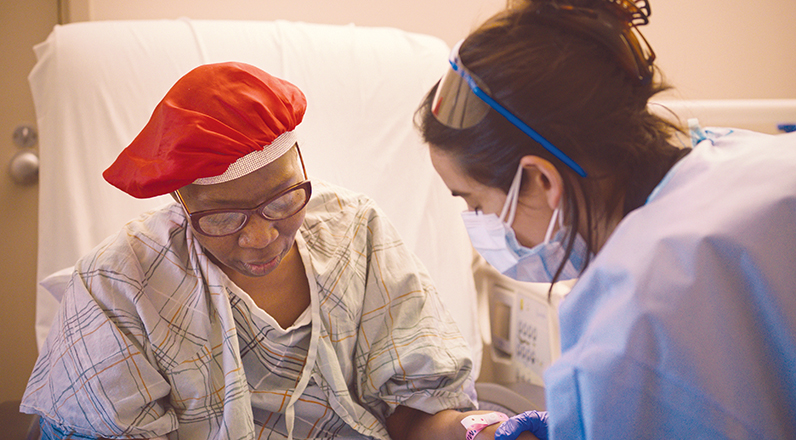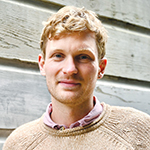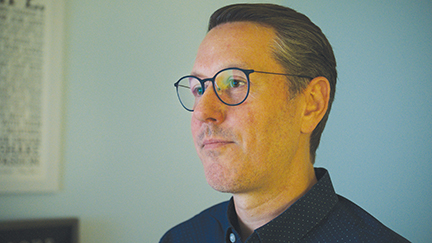
Margaret "Mati" Engel, right, in residency in spiritual care at The Mount Sinai Hospital in New York, ministers to a patient in a scene from the documentary A Still Small Voice. CHA in September hosted a webinar about the film that included its director, Luke Lorentzen.
The camera lens focuses on the joyful, prayerful, often messy world of hospital chaplaincy in A Still Small Voice, a film chaplaincy leaders hope will help elevate their work and educate others about its complexity.
"I thought this was a wonderful tool, to open that door to say this is what chaplains do — the good, the bad, the beautiful, the ugly, all the things. And it was a way of telling our story," said Erica Cohen Moore, the executive director of the National Association of Catholic Chaplains, during a CHA webinar about the film on Sept. 28.
She and Jill Fisk, director of mission services for CHA, moderated a discussion with the film's director, Luke Lorentzen, and Rev. David Fleenor, an Episcopal priest and clinical pastoral education supervisor who was one of the subjects of the film.
Ministrations
The film premiered at the 2023 Sundance Film Festival, where it won the U.S. Documentary Best Director Award. It will be released in theaters Nov. 10.
The documentary follows Margaret "Mati" Engel during her residency in spiritual care with a small cohort at The Mount Sinai Hospital in New York.

Engel interacts with patients in often gut-wrenching circumstances. The film opens with a scene of her talking with a man who is in bed and cannot speak but indicates he doesn't mind when she holds his hands.
She pushes a cart through the hospital hallways, offering tea and essential oils to weary hospital workers.
She prays with a young couple, new parents to twin girls, one of whom died at birth. She blesses the baby's body with holy water contained in a Styrofoam cup.
The scene prompted conversation during the webinar since Engel told the couple she planned to baptize the baby. Instead, she does a blessing during her ritual with the holy water. "They seem to have some bit of relief and some bit of peace," said Rev. Fleenor during the webinar. "I'm just gonna call that a win."
Boundaries
In the documentary, Engel talks with her colleagues and Rev. Fleenor, who was her supervisor, about maintaining emotional boundaries as a chaplain, something she finds challenging. Some scenes show Rev. Fleenor in virtual sessions with a trusted adviser about his struggles as a supervisor and maintaining his own boundaries. Eventually, Engel is given another supervisor for the final weeks of the program.

"Over the years I've experienced, broadly, two types of students," Rev. Fleenor said during the webinar. "Those whose boundaries are really open, and a lot gets through and that tends to lead to burnout, just to put it directly. And then others whose boundaries are really tight and closed and it means it's difficult for them to lean into vulnerability."
He tends to think of boundaries not as straight lines but more like nets or screens, where some things can get through, he said.
Advancing the field
The title of the film comes from a conversation Engel has with an elderly female patient who talks about how she copes with lung cancer. They talk about maintaining integrity in making decisions and grappling with the quality of her life going forward.
"I go at my own pace," the woman tells Engel, "in order to hear my own small voice."
Lorentzen said he got the idea for the documentary from his sister, who was working as a hospital chaplain and had just completed the education process before the pandemic. Lorentzen became "deeply curious" about the work and reached out to dozens of programs around the country, and connected with Mount Sinai, whose leaders were open and curious about the project.
Rev. Fleenor said he saw the documentary as "a potential opportunity to advance the field" of chaplaincy. In fact, some of his first conversations with others outside the hospital chaplaincy circle about the work were at Sundance and other film festival screenings.
Trust building
While filming, the filmmakers and the subjects worked hard at gaining each other's trust. Everyone filmed got the option to back out, which also meant returning to all patients who had previously agreed to participate. "Once the film was nearing the finish line, watching it with them, and confirming on multiple occasions that they still felt comfortable and excited about being included, that ended in a few scenes actually needing to be removed from the film," said Lorentzen. "So, there were multiple checkpoints that we set up along the way."
Lorentzen spent more than 150 days filming at Mount Sinai, many of them during the height of the pandemic. Several interviews are of people speaking behind goggles and masks. The pandemic added another layer of pressure and was a nonhuman character in the film, pointed out Rev. Fleenor.
When asked during the webinar how the project has shaped how he sees the world, he said, "I just continue to learn about the power of vulnerability, how hard it is, how rewarding it is, how fluid it is, given the circumstances."
Rev. Fleenor is now the manager of clinical pastoral education at Stony Brook Medicine in New York and Engel is doing pastoral work and artwork, spending time in Vermont and Berlin. The patients involved have seen the film, and one of the most meaningful parts of the process has been reconnecting and hearing from them, Lorentzen said.
Cohen Moore said the film captured the complicated nuances of hospital chaplaincy. She thanked Rev. Fleenor and Lorentzen for their work.
"Most people think chaplains just go in a room and pray, and it's so much bigger than that," she said. "I think the opportunity there for all of us is how do we continue to tell the story? This is an incredible platform, this is an international platform, to tell the story."
A discussion guide for the film A Still Small Voice.
